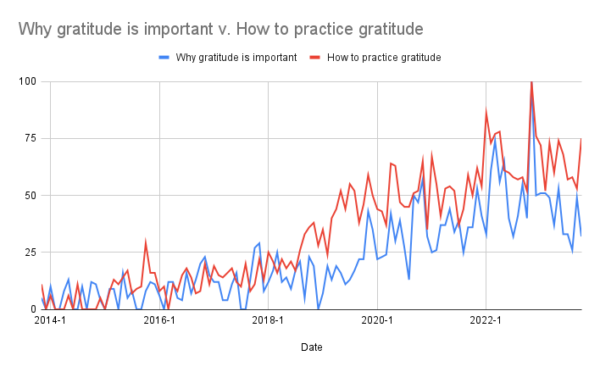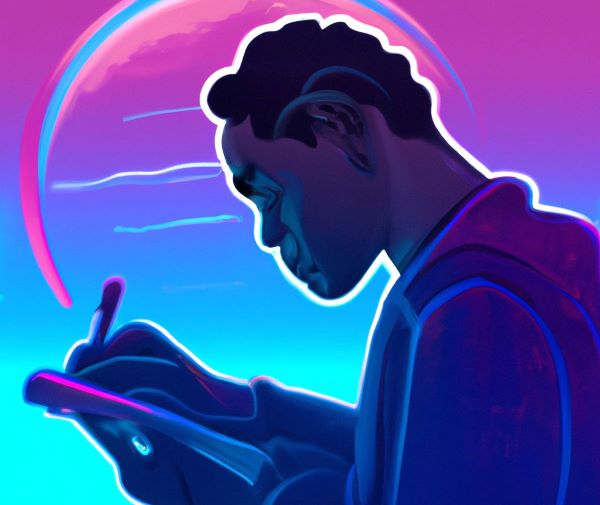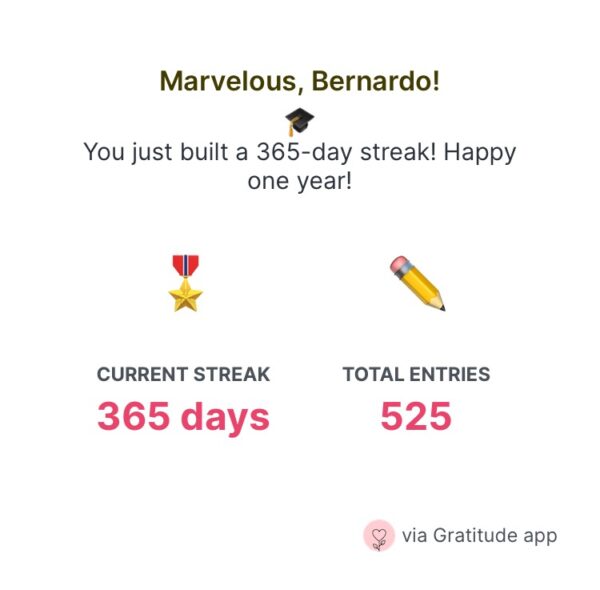Why gratitude is important: the case for giving thanks
Yesterday, I reached a milestone I didn’t know I needed or wanted. However, once it sunk in, I learned why gratitude is important and how it helped my mental health.
For days, the milestone had me both excited and overwhelmed. After all, it was hard to believe that so much time had passed. Some days, it was a drag, and others, I forward to it. Yet, that day, it felt quite sudden. I couldn’t believe how much time had passed.
That Sunday morning, I wasn’t thinking about it. Instead, I saw the notification on the screen, unlocked my screen, and wrote about the last time I spoke with a close friend and felt grateful. Virtual confetti appeared on the screen: I had practiced gratitude for 365 days straight.
This achievement was more than a gamified milestone for me. The virtual celebration had a deeper meaning. Exactly one year before, I went through my worst anxiety crisis, and, from that viewpoint, it seemed impossible–every day was a grind. If I spent 24 hours without a full panic attack, it was a miracle. So what could I be grateful for?
Dealing with anxiety is one of the reasons why gratitude is important
One of my common anxiety traits is endlessly googling symptoms. Though it has wained recently, I would spend hours and hours on end, falling deeper into a rabbit hole that only caused somatization so extreme that it would wake me up at night.
This anxious behavior is like physics in a far more striking way than we can envision. Let’s revisit the first law of motion, where an object will remain in its state unless an external force acts upon it.
The same happens in some anxiety cases. We’re stuck in a loop, and we need an outside force to take us out of it. The problem is that, in most cases, finding said force can feel impossible.
In my case, it was «fate». As weird as it may sound, I googled «how to stop googling symptoms,» and landed on an article by the Harvard Business Review. It had nothing to do with gratitude. Instead, it dealt with the anxiety that symptom-searching could generate. However, at the bottom, I saw an article, and the title hooked me: «Giving thanks can make you happier.»
The title hooked me, but I had too many questions: what did «giving thanks» mean? I clicked on it and found myself in another rabbit hole. Only, in this case, it was a good one.
Therapy is vital for anxiety
Here, I must pause and dive deeper into detail. In October 2022, I went through the worst part of my anxiety crisis at the same time my therapist retired. Though he did take an occasional ten-minute call, which I profoundly appreciate, he couldn’t provide therapy anymore.
It was in one of those calls that he told me that my PTSD was still strong. So, he recommended a form of therapy and a professional to work with. Ultimately, I couldn’t work out a schedule with his recommended professional, but I now knew what to seek.
After several searches and referrals, I met my therapist, who has helped me in more ways than I can tell.
Why do I tell you this? Because though gratitude is essential, it’s not the only part of my therapy. It’s an great compliment to a series of life changes that have made my life much easier, one of which is therapy.
What is gratitude?
The article was this one, and the first big lesson I got was almost so basic I felt shame. However, it proved vital. What does gratitude mean?
The word gratitude is derived from the Latin word gratia, which means grace, graciousness, or gratefulness (depending on the context). In some ways, gratitude encompasses all of these meanings. Gratitude is a thankful appreciation for what an individual receives, whether tangible or intangible. With gratitude, people acknowledge the goodness in their lives.
But, suddenly, I felt conflicted. At the peak, I’d wake up in the middle of the night with marks on my legs from all my scratching.
I couldn’t drive without crying. The protective feeling my car gave me became a shelter. There, I could be weak and no one would judge me.
At work, I wasn’t able focus and would often rush to the bathroom to try and control my breathing. So, how could I see the goodness in my life? I turned to my trusty friend Google once more, only that now, I wouldn’t look for symptoms. On the other hand, I sought ways how to practice gratitude.
Ways of giving thanks are aplenty; find yours
When I was researching for this article, I found one thing: I’m not alone. The world is wants to express thanks more and more as each day passes. It’s understandable. After all, this place isn’t getting any easier.
This chart shows a growing trend. The blue line shows how the term «why is gratitude important?» has grown in the last decade all over the globe. It’s even more fascinating when we see the searches for «how to practice gratitude».

The world wants to learn how to practice gratitude, and I was in the same boat. The fact that the world wants to learn more shows why gratitude is important.
How I practice gratitude
When I came up with this article, I had one problem. I didn’t want this to sound like a paid ad because it isn’t.
I had searched for many ways to practice gratitude, and I noticed one common factor. Expressing gratitude can be one of the simplest exercises in life.
Here’s the first way how to express gratitude. Take five minutes each day to actively relive what you’ve done throughout the day. You can learn a lot from this almost meditative exercise. Once the five minutes are over, you make a mental note.
For me, this wasn’t the ideal way to express gratitude. It felt abstract and unsubstantial, and I wanted to grasp gratitude, as impossible as it was.
Another way how to express thanks is by writing. Having a gratitude journal is a vastly popular method, and I found it incredibly therapeutic.
I delved into writing in a journal but found that carrying the notebook plus a painful carpal tunnel syndrome wasn’t ideal for the long run. After all, I could find myself writing for hours on end.
I needed something fast and practical. Whether I liked it or not, I had to accept that I carried my phone with me almost all the time. What if I could find an app that helped me practice gratitude?
Technology can help you be grateful
At first, I hated the idea. After all, technology was one of the biggest anxiety triggers in my case. Doomscrolling, symptom searching, social media, the list is endless. And, now, I had to rely on it to cure my anxiety? It was almost too ironic, but it was the most reasonable path.
That’s how I looked for an app that could teach me how to practice gratitude, and I landed on the aptly named Gratitude app.
What I loved about it was that it was easy. It simply sent me a prompt and motivated me to write. Not only that, but it also made me think. On day 347 of my gratitude journey, it asked me: «what is a favorite memory from your childhood?»
Actively seeking that memory was beautiful, and I realized that there were a lot of things that fit into that category.
As soon as I started using it, it helped me break out of my anxious self and find gratitude. The first entry read:
What was the best thing that happened today or yesterday?
My answer was:
I rested.
Sleep had been a nightmare, but that day, October 9th, 2022, I had managed to sleep for eight hours straight. Now, I knew what I had to be thankful for, and the exercise became easier as the prompts became more creative.
It’s not always easy to see why gratitude is important
I can’t say that I’ve felt thankful every day. There are some days when it’s hard to think of ways to express thanks. I can think of the day I lost my job or when the PTSD acted up.
Fortunately, after doing the same thing every day for a year, I learned to notice the little things. Some entries are three words long: «I worked out,» while others have several paragraphs.
Expressing thanks isn’t only about keeping a routine. There’s a lot of evidence on why gratitude is important. Two studies showed that the regular practice of gratitude can enhance our long-term happiness by 10%.
Then, there’s being aware of positive things around us. Initially, I felt conflicted because it felt like «well, you could be worse,» but gratitude made me flip the witch.
Now, it’s all about how I see the world: this is happening right now. I won’t create hypotheticals. «I could be worse» is an escape from your reality. It’s distancing from what’s happening.
Instead, this is my reality, and I’m grateful for X, Y, or Z.
The biggest surprise I’ve gotten from saying thanks is how others have caught up on it. Just hours after posting about my accomplishment, I got the following text:

Gratitude gave me peace
It’s been one year since my worst anxiety crisis began. I can’t say I’m over it, but I know what it means to be in a tough spot and what it means to be in a good one. Right now, I’m leaning more toward the latter.
Things have been better, and therapy has been a great help. At the same time, so has saying thanks. To a point, it’s ironic. It took me being in very dark places to realize why gratitude is important, and for that, I give thanks.

